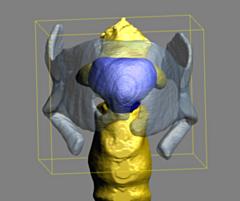Project 4018: T. Darwaiz, B. Pasch, T. Riede. 2022. Postnatal remodeling of the laryngeal airway removes body size dependency of spectral features for ultrasonic whistling in laboratory mice. Journal of Zoology. 318:114-126.
Abstract
In many mammals, spectral properties of acoustic signals scale with body size within and among species. In rodents, however, despite drastic changes in body size, fundamental frequency (F0) range of ultrasonic whistles produced for social communication remain relatively uniform from birth to adulthood. Such divergent patterns may be due to a novel sound production mechanism unique to rodents involving an intralaryngeal midline pocket termed the ventral pouch. In this study, we analyzed the postnatal shape and size of the laryngeal airway in CD1 mice over ontogeny to better understand the association between ventral pouch geometry and F0 of ultrasonic whistles. Ventral pouch volume (0.06 ± 0.01 mm3) did not differ between pups and 1-year-old adults despite extensive shape-inducing remodeling of the intralaryngeal musculature and connective tissue. In contrast, ventral pouch volume was 50% less in 2-year-old compared to 1-year-old mice. Thus, allometry of the laryngeal airway appears to explain spectral overlap between ultrasonic whistles of young, small mice and older, larger mice. The causal association between the reduction in vocal behavior and a seemingly shrinking ventral pouch in geriatric mice remains unclear. Together, these data inform our understanding of the postnatal development and remodeling of the intralaryngeal airway in Mus musculus.Read the article »
Article DOI: 10.1111/jzo.13003
Project DOI: 10.7934/P4018, http://dx.doi.org/10.7934/P4018
| This project contains |
|---|
Download Project SDD File |
Currently Viewing:
MorphoBank Project 4018
MorphoBank Project 4018
- Creation Date:
25 May 2021 - Publication Date:
20 November 2023
This research
supported by
Authors' Institutions ![]()
- University of Arizona
- Midwestern University
- Northern Arizona University

